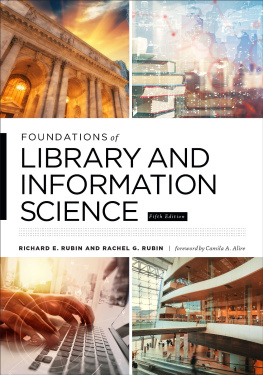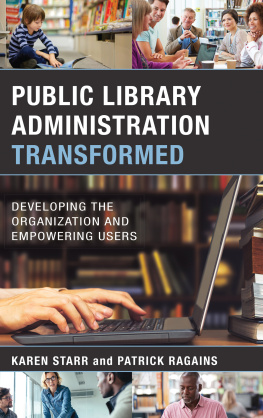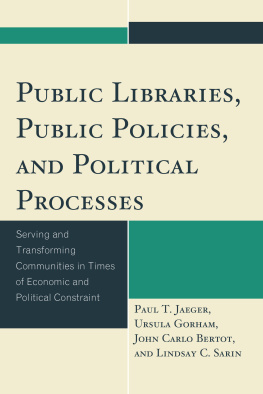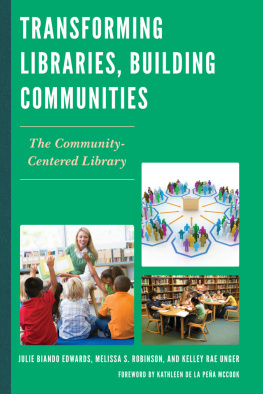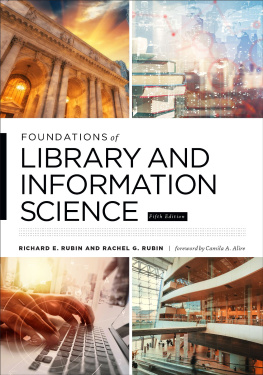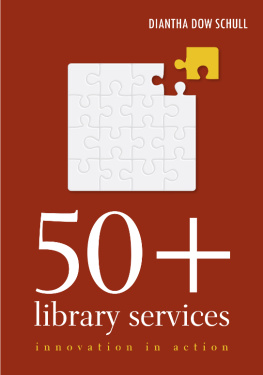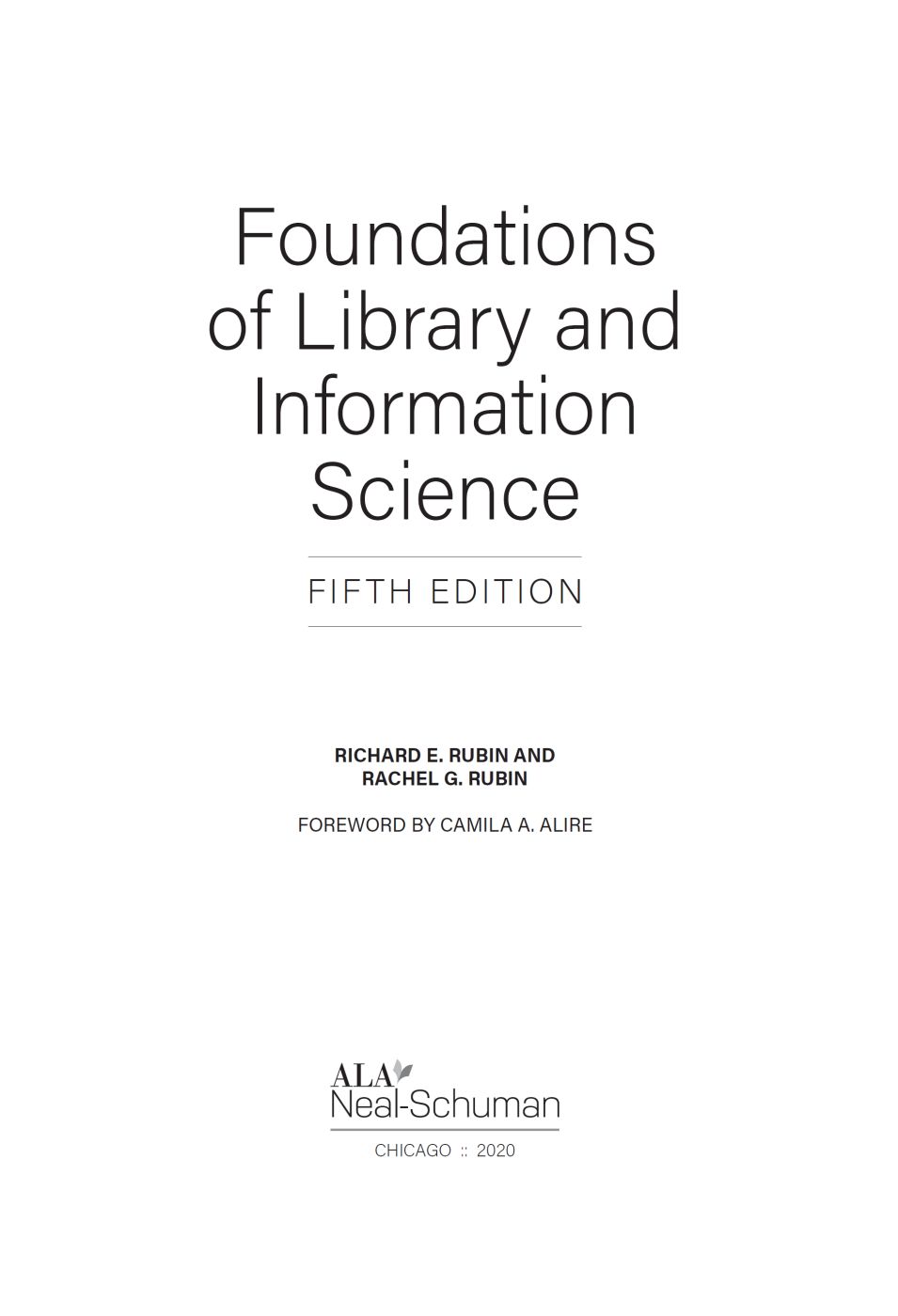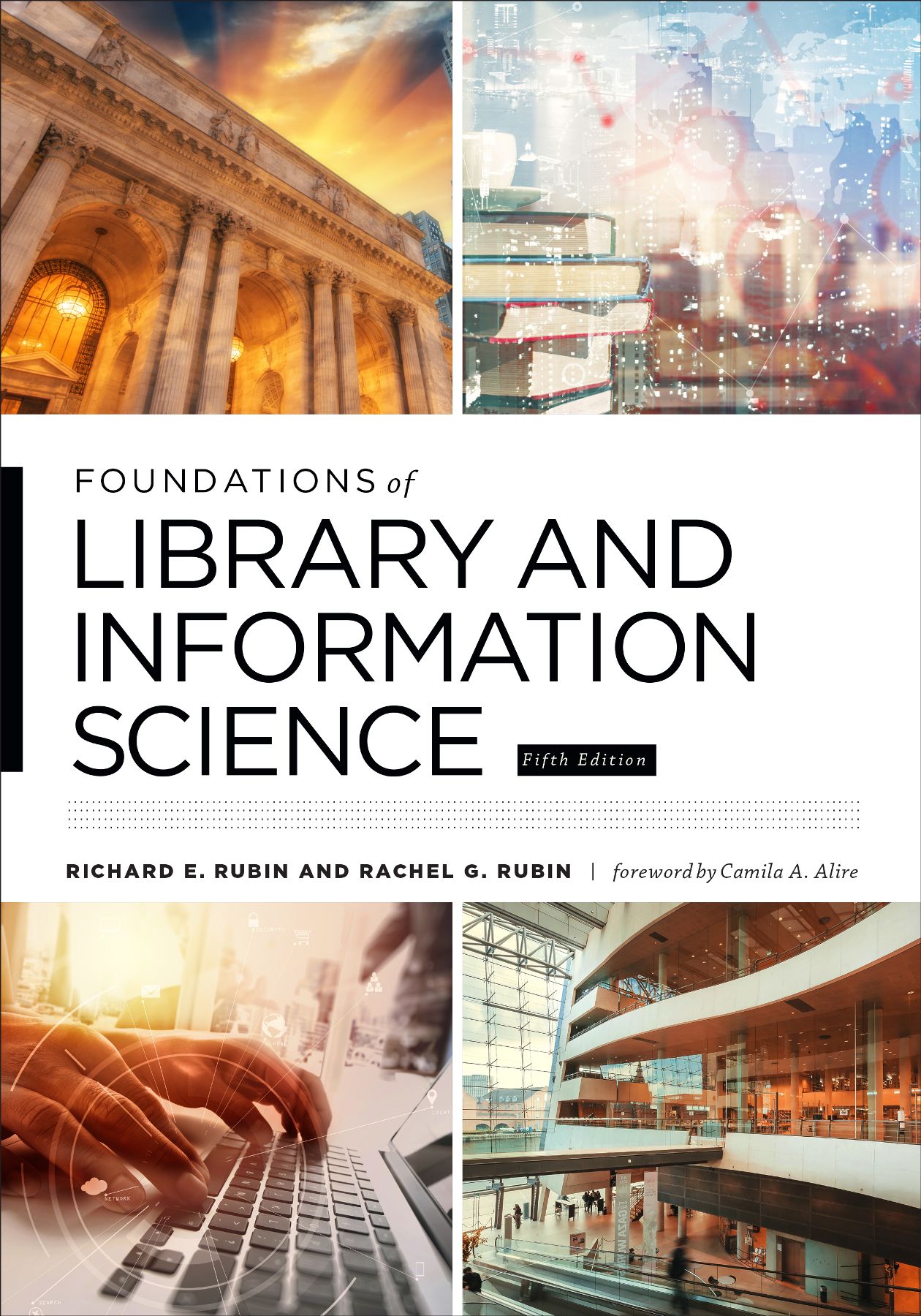
Foundations of Library and Information Science
ALA Neal-Schuman purchases fund advocacy, awareness, and accreditation programs for library professionals worldwide.
2020 by the American Library Association
Extensive effort has gone into ensuring the reliability of the information in this book; however, the publisher makes no warranty, express or implied, with respect to the material contained herein.
ISBNs
978-0-8389-4744-9 (paper)
978-0-8389-4757-9 (PDF)
978-0-8389-4755-5 (ePub)
978-0-8389-4756-2 (Kindle)
Library of Congress Cataloging-in-Publication Data
Names: Rubin, Richard E., 1949- author. | Rubin, Rachel G., author. | Alire, Camila A., writer of foreword
Title: Foundations of library and information science / Richard E. Rubin and Rachel G. Rubin ; foreword by Camila A. Alire.
Description: Fifth edition. | Chicago : ALA Neal-Schuman, 2020. | Includes bibliographical references and index. | Summary: This edition has been designed to respond to the many changes occurring in the LIS field and provides a firm foundation of knowledge and guidance for LIS students and professionals alikeProvided by publisher.
Identifiers: LCCN 2020000776 (print) | LCCN 2020000777 (ebook) | ISBN 9780838947449 (paper ; alk. paper) | ISBN 9780838947555 (epub) | ISBN 9780838947562 (kindle edition) | ISBN 9780838947579 (pdf)
Subjects: LCSH: Library scienceUnited States. | Information scienceUnited States.
Classification: LCC Z665.2.U6 R83 2020 (print) | LCC Z665.2.U6 (ebook) | DDC 020.973dc23
LC record available at https://lccn.loc.gov/2020000776
LC ebook record available at https://lccn.loc.gov/2020000777
Cover design by Kim Thornton; imagery Adobe Stock.
CONTENTS
A PPENDIXES
A s an author and educator in library and information science, I recognize that there are basically two types of LIS students: those who have some kind of LIS experience and those who dont. While reading this new edition of Foundations of Library and Information Science, I continually asked myself if it would appeal to both such students. I also asked myself whether this book would satisfy the current needs of LIS faculty and instructors who would use this book as a core text. And, as an academic library administrator who has hired LIS graduates, I asked myself if this text provided the crucial underpinnings any LIS graduate should have to work in most types of library and information environments. The answer to all these questions is a resounding yes.
What is presented in this fifth edition is the collective works and experience of the Dynamic DuoDr. Richard E. Rubin and Dr. Rachel G. Rubin. This father-daughter team provides scholar and practitioner expertise. Rachels contributions to this book, and her practitioners perspective, keep and validate the library in library and information studies. I have had the pleasure of having Rachel in a PhD seminar in managerial leadership that I co-taught. Not surprisingly, Rachel was one of our star doctoral students, and I have followed Rachels career blossoming since then. Known for her creative and innovative leadership, she brings strong library experience as a past director of both academic and public libraries, Capital University Library and Bexley Public Library, respectively. That is not to diminish Rachels contributions as a scholar. Her research in organizational citizenship informs not only her practiceparticularly in her current role as Associate University Librarian for Research and Learning at the University of Pittsburghbut also her scholarly contributions to this book. Although I have not had the pleasure of knowing Rick Rubin personally, I have admired his stellar career as an LIS director and educator at Kent State University. His textbook contributions to the scholarly field have made him one of the most prominent names in library and information science education. Nothing delights me more than to see this pair working together to contribute to the body of LIS literature.
The general format of the fifth edition presents an excellent overview and historical perspective for each section followed by new information on the issue or topic. This approach should be most helpful to the LIS student who has never worked in any library or information setting. As with most textbooks, the main purpose of a new edition is to provide more current information to ensure that faculty and students have access to updated material. Sometimes that update can be very substantive. In this new edition, the authors have added critical sections on fake news, the Library Research Model, service to immigrants, sustainability as a core value, virtual reality in libraries, current debates in intellectual freedom, and many more topics. They have also expanded the sections on the history of service to African American librarians and communities and tribal libraries.
Social justice and racism are issues close to my heart. For me, it should be noted that the authors do an excellent job of adding new materials concerning social justice issues. They do not shy away from controversial subjects in our profession and in our communities. And although the previous edition engaged with racism, primarily as it related to positions taken by the American Library Association, this new edition addresses social justice and human rights in a more holistic way and includes an excellent overview of critical race theory. Additionally, the authors do an exceptional job of discussing neutrality in the context of critical librarianship (#CritLib) across library and information settings.
It is my honor and pleasure to provide the foreword for this book. As a former academic library dean, a professor of practice in both PhD and MLIS programs, and a co-author of two LIS textbooks and three books for LIS practitioners, I recognize the importance of this text in its contribution to understanding the foundations of our profession.
Further, this book is not only relevant for faculty and students but also is valuable for any practitioner who wants a good professional read. I thoroughly enjoyed every aspect of this book; I learned new information and enjoyed the historical perspectives. I continued to tell myself: I wish I had known that when I was working!
I recommended it unconditionally!
Camila A. Alire
Dean Emerita, University of New Mexico & Colorado State University
ALA President, 200910
Professor of Practice, LIS, Simmons College
Principal, Alire & Associates
W hen the first edition of this book was published in 2000, the internet age was in its infancy. Amazon was only six years old, and Google was two years old; it would be four years before Facebook appeared and seven years before the first iPhone. With each subsequent edition in 2004, 2010, and 2016, the impact of the digital infrastructure on our social, educational, and economic environments grew more pronounced. A constant refrain and source of trepidation throughout this period was that the pace of change across these dimensions was accelerating dramatically, fueled by the insatiable appetite of a 24/7 information cycle and a hungry populace. Now, twenty years after that first edition, commenting on the rapidity of technological change or its omnipresence in our lives is no longer novel. This is not to say, however, that the impact is any less profound. All types of information organizations feel these stresses, and libraries are particularly vulnerable. The implications for library and information science (LIS) professionals are exciting, challenging, and ongoing. Today, we navigate a number of complex environments, both digital and analog. We face an onslaught of fake news, the manipulation of social media content, continued threats to net neutrality, conflicting expectations of privacy, and ongoing funding challenges exacerbated by the 2020 COVID-19 pandemic. Libraries are swept up in controversies over services to immigrants and the promotion of inclusive programming.
Next page
